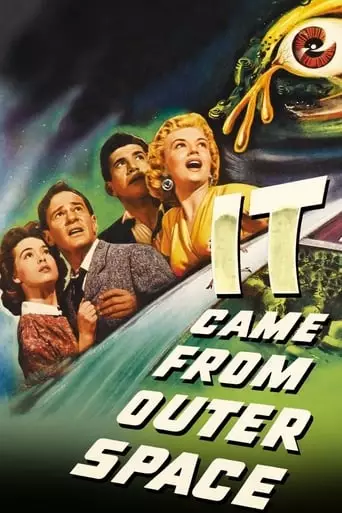
It Came from Outer Space (1953) Watch Online Free
Author & amateur astronomer John Putnam and schoolteacher Ellen Fields witness an enormous meteorite come down near a small town in Arizona, but Putnam becomes a local object of scorn when, after examining the object up close, he announces that it is a spacecraft, and that it is inhabited…
It Came from Outer Space (1953) is a science fiction film directed by Jack Arnold, based on a story by Ray Bradbury. The plot revolves around John Putnam, an amateur astronomer, and his fiancée Ellen, who witness the crash of what they initially believe to be a meteorite in the Arizona desert. Upon investigating, John discovers that the object is an alien spaceship, and the creatures inside are not hostile but merely trying to repair their ship after the crash. However, as the aliens begin to assume the appearance of local townspeople, the community grows suspicious, and paranoia spreads. John and Ellen must navigate the tension between the aliens, who are not malicious, and the fearful, distrustful townsfolk.
The film’s central theme explores the fear of the unknown and the consequences of misunderstanding, drawing parallels to Cold War anxieties about conformity and the fear of infiltration. The aliens, who take the form of human beings but lack their personalities, symbolize the fear of “otherness” and the potential for infiltration by forces perceived as threatening.
The movie stands out for its exploration of paranoia and fear of the “other” through the lens of alien invasion. Unlike many of its contemporaries, It Came from Outer Space presents aliens not as monsters but as peaceful beings attempting to fix their ship. This inversion of the typical alien trope adds a layer of complexity to the narrative, offering a commentary on the irrational fear of the unknown. The film’s depiction of the townspeople’s increasing suspicion and violence toward the aliens reflects the societal tensions of the era, particularly the fear of communism and the resulting conformity that defined the Cold War period.
Another significant theme is the idea of communication and misunderstanding. The film suggests that fear often arises from a lack of understanding and the inability to communicate with those who are different. The aliens’ peaceful intentions are lost on the townspeople, who view their shape-shifting abilities as a threat. This theme is particularly relevant to the era’s political climate, where fear of the unknown often led to irrational and destructive actions.
It Came from Outer Space was an important early entry in the sci-fi genre, marking a shift away from the typical alien invader narrative and offering a more nuanced view of extraterrestrial life. Its influence can be seen in later films, such as Invasion of the Body Snatchers (1956), which also dealt with themes of paranoia and the fear of infiltration. The film’s use of the “alien as misunderstood being” trope was ahead of its time and has since been explored in various other media, including Bradbury’s own Fahrenheit 451.
The movie also helped establish Jack Arnold as a key director in the sci-fi genre, known for his ability to blend suspense with thoughtful social commentary. The film’s eerie atmosphere, created through Arnold’s direction and the use of a theremin soundtrack, adds to its sense of unease, making it a standout in the 1950s sci-fi genre.
After watching It Came from Outer Space, you’ll likely be left with a sense of unease and contemplation. The film’s slow-building tension and its exploration of fear and misunderstanding will make you reflect on how society often reacts to the unfamiliar. The resolution, which challenges the audience’s expectations of a typical alien invasion, offers a bittersweet commentary on the dangers of miscommunication and the consequences of fear. The film’s thoughtfulness and its ability to provoke reflection on human nature will stay with you long after the credits roll.
In addition to the intellectual stimulation, the film’s eerie atmosphere and suspenseful tone will likely leave you feeling both intrigued and unsettled, questioning the nature of fear and the unknown.
